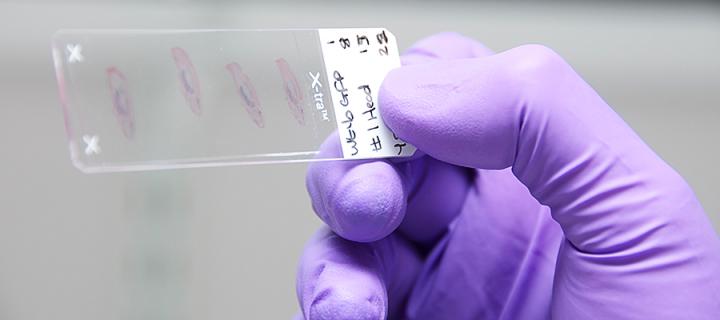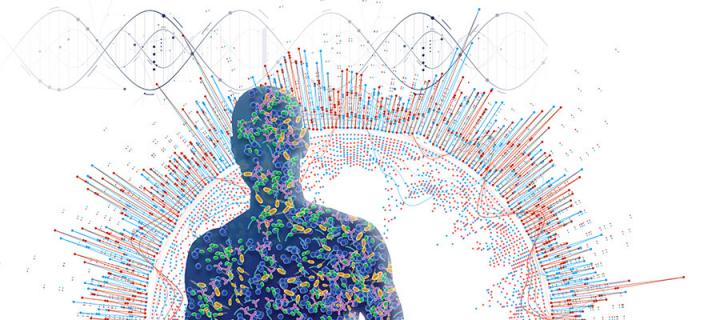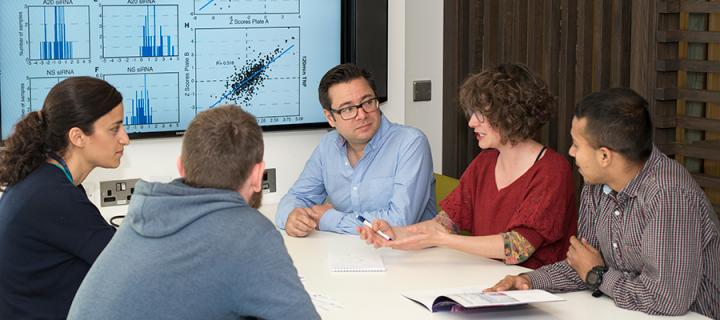Research
Our multidisciplinary approach, researchers, collaborations and funding.

"Our goals are to carry out excellent genetic, genomic, cellular and clinical science, so that we contribute significantly to the understanding of human development, physiology and disease, and apply this knowledge for the benefit of patients and society. This broad vision reflects the diversity of research within the Institute of Genetics and Cancer and we aspire to be world class in key themes, bringing innovation and unique twists to the Institute's discovery and translation."
Professor Margaret Frame FRSE FMedSci, Director of the Institute of Genetics and Cancer at the University of Edinburgh
Researchers
The Institute of Genetics and Cancer partnership brings together engineers, scientists and clinicians from fields as diverse as mathematics, computer sciences, bioinformatics, chemistry, biology and medicine to study human health and disease using modern multidisciplinary approaches.
Over 70 Principal Investigators and 500 staff and PhD students are working together in a single, scientific endeavour. More information about our researchers and research focuses can be found on our component Centre websites:
- MRC Human Genetics Unit (MRC HGU)
- Edinburgh Cancer Research
- Centre for Genomic and Experimental Medicine (CGEM).

Cross-disciplinarity
Today’s cutting edge research often necessitates projects that involve experts from a broad spectrum of scientific disciplines; from mathematics, physics and engineering, through computer sciences and informatics, to chemistry, biology and medicine. Advances in technology and increasing complexity of biomedical data require modern biomedical scientist to be able to understand and communicate areas that were traditionally reserved for mathematicians or physicists. Bridging knowledge gaps between life sciences and mathematics/physics/informatics represents one of the major challenges in modern biomedicine. To this end a pioneering Cross-Disciplinary Post-Doctoral Fellowships (XDF) programme has been initiated at the Institute with financial support from the Medical Research Council and the University of Edinburgh. The aim of the XDF Programme is to train truly cross-disciplinary leaders in quantitative biomedicine who will be able to catalyse and accelerate future progress in data-driven computational biomedicine.
Cross-Disciplinary Post-Doctoral Fellowships programme (XDF)
Collaborations
Institute research is positioned in a very rich translational and multi-disciplinary environment through interaction with University cross-campus disciplines, such as the physical sciences, and close links with Industry and the NHS, through the Clinical Genetics Service.
Key collaborations within the University of Edinburgh include:
- Roslin Institute
- Queens Medical Research Institute
- MRC Farr Institute
- Usher Institute for Population Health Science and Informatics (in eHealth)
- School of Informatics
- School of Chemistry and the Centre for Translational Chemical Biology.
Strategic collaborations with other Higher Education Institutions include:
- Heriot-Watt University (super-resolution optical imaging (ESRIC), microfluidics and bio-engineering (Edinburgh Cell Genomic Consortium))
- Sanger Institute (joint initiative on single cell genomics)
- St Andrews University (MRC Molecular Pathology Node)
- University of Glasgow (Scottish Genomes Partnership)
- University of Oxford and Imperial College (lung targeted gene therapeutics)
- University of Oxford (Structural Genomics Consortium)
- University College London (Brain Cancer Accelerator Programme).
Innovative partnerships with the pharmaceutical industry include, amongst others:

- Janssen
- Carrick Therapeutics
- Eli-Lilly
- AstraZeneca
- Radius Health Inc.
- Genentech
- Boehringer Ingelheim
- GlaxoSmithKline
- Biogen
Funding
The Institute of Genetics and Cancer has raised £127M of research funding in the last five years. Of this, the Medical Research Council has provided £65.7M core funding for infrastructure and research programmes in the Institute predominantly through the MRC Human Genetics Unit. CRUK has provided £6M infrastructure to support around £25M research funding (won via response mode) to the CRUK Edinburgh Centre. The CRUK Edinburgh Centre has the highest number of non-clinical CRUK fellowships of all CRUK Centres.
Recent strategic awards include the MRC Molecular Pathology Node (Edinburgh and St Andrews; £2M) and the Scottish Genomes Partnership (£6M jointly funded by MRC and CSO). Together these provide new impetus in Edinburgh to deliver the benefits of medical genomics and molecular pathology to the NHS.
Examples of prestigious awards made to established investigators:
- 8 ERC grants: 4 Advanced Investigator grants (Tim Aitman, Wendy Bickmore, Margaret Frame and Chris Ponting), 1 ERC consolidator grant (Liz Patton) and 3 starting grants (Omar Albagha, Jose Garcia–Perez and Andrew Jackson).
- 2 CRUK Programme grants (Malcolm Dunlop and Margaret Frame)
- 2 Wellcome Trust Investigator Awards (Javier Caceres and Chris Ponting)
- 1 MRC Senior Fellowship (Nick Gilbert)
- Senior CRUK Fellowships to IGMM affiliate PIs (e.g. Steve Pollard)
- 1 EPSRC Healthcare Technologies grant (Asier Unciti-Broceta)

